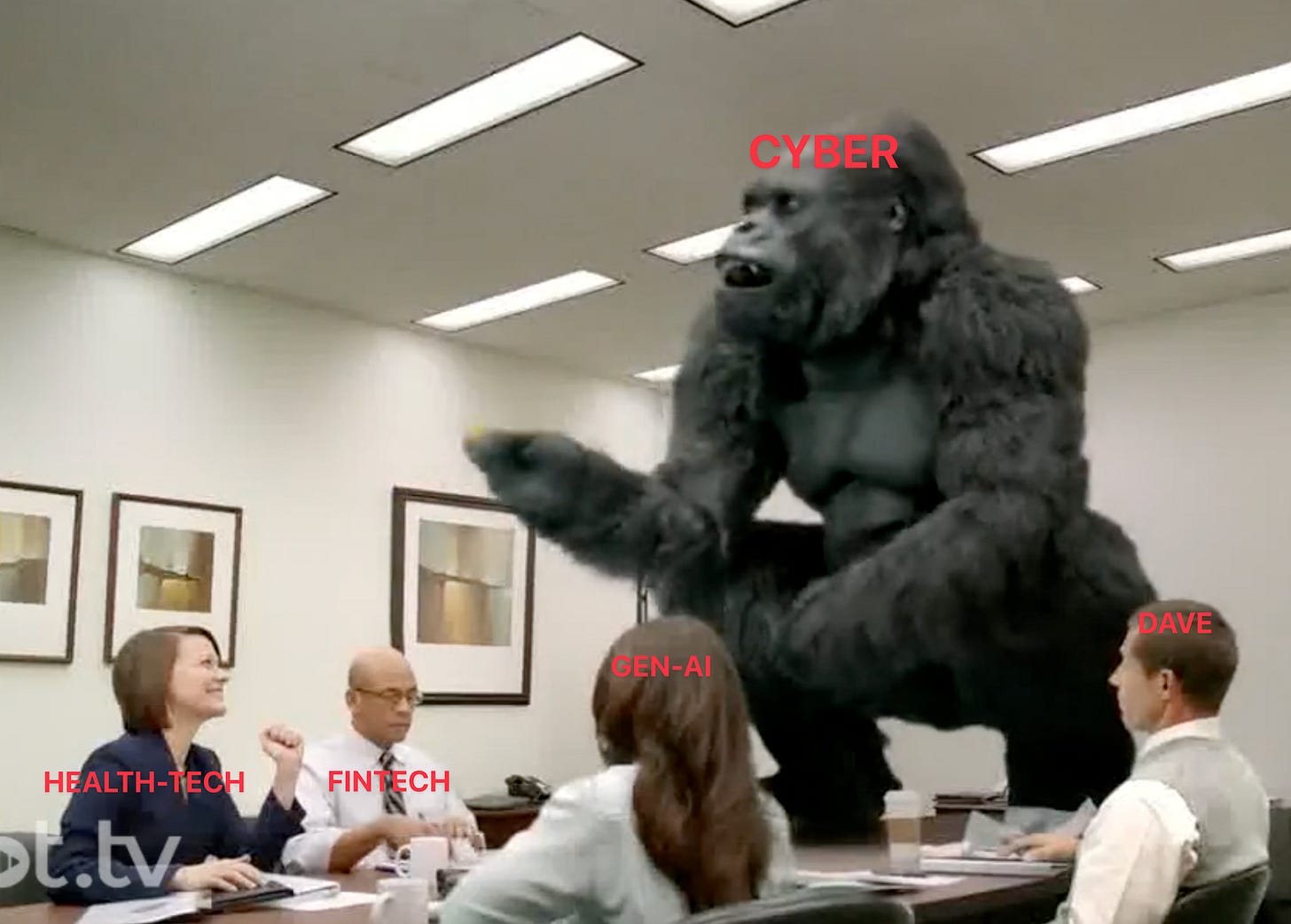The Coolest, Hottest, Unsexiest, Most Globally Important Israeli Company You’ve Never Heard Of
Also: Is Israeli cyber too big? IDF innovates battle rations; Would you B2B your brain?
Israel Tech Insider strives to offer sharp, insider analysis of Israel’s tech industry—its companies, power players, and strategic shifts—delivered by Amir Mizroch, former Wall Street Journal EMEA tech editor. More about this newsletter
Reach out to me with your feedback/questions at amir@israeltechinsider.com
The Coolest, Hottest, Unsexiest, Most Globally Important Israeli Company You’ve Never Heard Of
TL:DR: ZutaCore, a Sderot-San Jose startup focused on cooling systems for data centers, is gaining momentum as demand for AI computing surges.
I have a bit of mileage with this story. When I joined The Wall Street Journal in 2014 we reported that companies like Facebook (now Meta) and Google were just starting to set up data centers to power their growing digital services. These data centers—giant warehouses packed with row upon row of computers storing, processing, and delivering data 24/7—power everything from dating recommendations to nuclear fission simulations.
These facilities have been estimated to handle over 95% of the world’s internet traffic, ensuring real-time connectivity for billions of users. They’ve also become critical infrastructure not only for economic competitiveness but for national security, with governments increasingly prioritizing data sovereignty and control. They are the unseen backbone of the internet and the digital economy, and they guzzle a massive amount of energy, much of which goes to cooling them.
That's why back in 2014, what I found particularly curious about these data centers is how many of them were built in places like Sweden, Norway, Finland, and Iceland. Why the cold Nordics?
Turns out that with great AI comes great electricity.
Data centers currently account for an estimated 1-1.5% of global electricity use, and that figure is expected to rise sharply with the growing adoption of AI and cloud services. Electricity gives off heat. Too much heat cripples data centers. Less data crunching means less AI. Less AI means your company ‘s services aren’t as good as your competitor’s. Your stock price plunges. Shareholders sell. Boards yell. Game over.
The challenge to scaling exponentially more computing power is no longer silicon—it’s heat. Power-hungry and running hot, data centers are hitting thermal walls that threaten progress. Keeping them cool is big business. The data centre cooling industry is worth around $22 Billion, and is doubling in size roughly every 5 to 7 years.
Which brings us to a company called ZutaCore. Unlike big, noisy, energy-hungry, water-guzzling industrial air conditioners, ZutaCore’s HyperCool technology uses a waterless system that directly cools chips used in data centers—cutting energy use by up to 50%, doubling rack density, and eliminating the need for costly air conditioning. And it does this inside the server, on the chip.
I first heard of ZutaCore in early 2022 while working on a project for one of their earliest investors, The Elah Fund. I couldn’t completely understand how they were doing what they were doing, but I recognized its importance.
So I was not surprised to see ZutaCore pop up again. And then again. Just this year, the company launched a waterless cooling system designed for Nvidia’s newest AI superchips, and revealed a system that reuses heat from servers, teaming up with car parts giant Valeo to mass-produce it. They secured new funding from Carrier Ventures, the venture arm of Carrier Global Corporation, a $52 Billion heating, ventilation, air conditioning, and refrigeration multinational based in Palm Beach, Florida (nice place).
It has offices in Taiwan and India, and plans global expansion. Intel, Dell, Equinix and AMD are integrating ZutaCore technology into their designs. Global shipping giant ZIM just invested in them. And to round it off, the company just announced it is working with SoftBank and Foxconn on AI-heavy data centers. They’ve been busy.
This unassuming company, located in Sderot (2 miles from the Gaza Strip), and whose offices were attacked on October 7, has quietly become one of the foundational players in the global AI infrastructure boom.
The implications are ginormous. With energy costs soaring and sustainability mandates tightening, companies like Amazon (AWS), Microsoft (Azure), Google (Google Cloud), and Alibaba Cloud are under pressure to do more with less—less water, less real estate, less capital outlay. ZutaCore’s system, which cools the machines from the inside, isn’t just about marginal efficiency gains; it’s about unlocking future compute capacity in a world running out of space, power and patience.//
//The 800 Pound Cyber Gorilla in the room
TL:DR: Cybersecurity dominates because it's seen as mission-critical, both commercially and geopolitically, and AI cyber is booming. Meanwhile, other sectors contract.
Israeli cybersecurity has long been the Billion Dollar Gorilla in the Israel tech room. The Gorilla is hungry. Fresh data from IVC-LeumiTech's Q1 2025 review shows the sector captured 42% of all Israeli tech investment—$906m across just 25 deals—while digital health, life sciences, generative AI, and fintech all contracted.
AI cyber is making the gorilla even bigger. Three cybersecurity giants—Island, Cybereason and Dream Security—alone secured $470m. Six companies raised over $50 million each. Google's pending $32 billion acquisition of Wiz, is the biggest gorilla of them all.
Meanwhile, generative AI deals dropped from 18 to 12 quarter-on-quarter. Fintech deals have dropped from 15 to 10, and life sciences are sluggish—a mix of regulatory drag and longer development cycles.
This narrowing poses a strategic dilemma: Israel's outsized cybersecurity prowess—born of necessity and honed through military-civilian technology transfer—represents genuine competitive advantage. Yet overspecialization creates vulnerability. Should security technology face disruption or commoditization—the country has fewer alternative growth engines in reserve.//
//An Army Marches on its Stomach
TheMarker (Hebrew+Paywall) takes a look at how, 18 months into the war, the Israel Defense Forces is addressing the unsuitability of combat rations for protracted deployment.
Like the IDF itself, combat rations are designed for short-term deployments. The standard pack—tuna cans, beans, corn, halva bars, fruit drink powder—offers calories, not nutrition. As soldiers rotate through protracted operations across multiple fronts, the limitations of these rations are taking a toll on health and morale. This mismatch between ration design and the demands of extended operations has led to issues with soldier nutrition and morale. Troops are complaining, parents are getting involved, and the army has egg on its face.
Recognizing this, the IDF has been updating its field rations to include more diverse and nutritious options, such as freeze-dried meals like goulash, turkey shawarma, and meatballs that can be prepared with water-activated heaters. However, these improvements are still being phased in, and many soldiers continue to rely on the older, less suitable rations during long-term deployments.
To fix this, the army has launched Innotal, a new program connecting food-tech startups with frontline needs. The goal: nutritious, shelf-stable, and ready-to-eat meals, tailored for field conditions. These include plant-based meals rich in vegetables and protein, and specialized gluten-free products for soldiers with celiac disease, which is a significant shift in military logistics prioritizing nutrition and morale alongside operational requirements.
Each startup gets about ₪200K and direct access to IDF logistics experts to adapt products for harsh environments. The army gets better rations. The startups get a real-world testbed and a shot at long-term military contracts.///
//Most Likely To Be Most Unpromising
Each year, Israel’s tech press anoints a fresh crop of “most promising” startups, a ritual that both reflects and shapes the prevailing winds in the local innovation scene. The 2025 list arrives amid tectonic shifts: a boom in AI, internal political turmoil in Israel, and a mounting geopolitical chill in global trade. But as Globes’ retrospective (Hebrew) on previous winners shows, not all that glitters is gold.
Several startups once hailed as Israel's "most promising" are now facing significant challenges. Melio and Rapyd, both fintech darlings, have had to slash valuations and contend with waning investor enthusiasm. Even Granulate, which was acquired by Intel for $650 million, was ultimately shut down due to integration difficulties.
What went wrong? Easy money over the past few years led startups to chase growth at all costs, creating products that were really just features waiting to be swallowed by bigger platforms. Investors now want proof of controlled spending, solid distribution channels, and defensible business models—not just big ideas.//
//B2B Your Brain
TL:DR: BrainVivo’s Open-Brain is an open-source AI toolkit that maps visual inputs to predicted brain responses, turning images into brain-inspired vectors to help machines "feel" more like us.
BrainVivo, an Israeli neuro-AI startup, has launched Open-Brain, an open-source software repository that aims to give artificial intelligence a new layer of perceptual realism. The startup uses fMRI (functional Magnetic Resonance Imaging) to scan people's brains while they look at different images. This scanning method tracks blood flow in the brain—when a specific region becomes active (say, in response to a happy or disturbing image), more blood flows there. By recording which areas light up for each type of visual input, BrainVivo builds a kind of “emotional map” of how the average human brain reacts to different kinds of pictures. These reactions are then turned into data that AI models can learn from and simulate.
This is not neuromorphic hardware—AI chips are designed to mimic the structure and firing patterns of the human brain, neuron by neuron. Nor is it an emulation of consciousness. Open-Brain is less a synthetic mind than a perceptual filter—a new kind of affective interface between media and machine. It opens interesting pathways for AI systems to respond as if they were human, even if they don’t understand like one.
Its open-source release is strategic. BrainVivo retains control of its proprietary neuro-imaging pipeline while courting adoption across the AI ecosystem. But challenges remain. The “Common-Brain” is a population-level abstraction: it does not capture cultural nuance, memory, or individual emotion. And while the team is admirably transparent about these limitations, the risk is that developers mistake correlation for cognition, and deploy emotionally manipulative systems without ethical guardrails.
Even so, the intent is serious—and the timing notable. As generative AI races to produce content that “feels” human, tools like Open-Brain offer a way to encode “feelings” without retraining foundation models. What comes next may not be synthetic minds, but synthetic empathy—AI systems that respond not with understanding, but with approximation. Whether that is progress or peril depends on how far we’re willing to let the simulation stand in for the self.
Here’s their GitHub page if you really want to free your mind.//
//M&AGA [Make M&A Great Again]
Israel will implement a major tax amendment on May 1st, removing long-standing barriers to tech mergers and restructurings. Unlike typical tax legislation, this one actually offers relief, allowing share-based transactions that previously required cash. New investors can join right after a merger. Crucially, the change also removes significant barriers for foreign investors, who are now free to invest and exit more easily, making Israel’s tech sector EVEN MORE attractive globally. M&AGA ////
People Moves
TBD VC Launches $35M Fund; hopes to make tech careers more accessible to combat vets
Venture capitalists David Citron and Alan Buch announce the launch of TBD VC, a $35 million fund focused on leading pre-seed investments and participating in seed rounds of startups founded by Israeli entrepreneurs in cybersecurity, enterprise software, and infrastructure. TBD plans to invest in 20 startups with initial checks of approximately $1 million. TBD will dedicate a portion of the fund’s profits to Back the Warrior, an organization that helps discharged soldiers build careers in tech.
Jenny Bruk has been appointed SVP Engineering at Semperis, a cybersecurity company that provides an identity management and security platform. With extensive leadership experience at Microsoft, Philips (where she built products now used in leading hospitals worldwide), and Armis (where she led security product development), her appointment is significant as Semperis, which secures over 100 million user identities recently secured $125 million in funding at a valuation exceeding $1 billion.
Yaniv Feldman has started a new position as Managing Partner at Flag Capital. Founded by the team behind popular tech news site Geektime, Flag Capital is a pre-seed VC fund powered by founders, unicorn CEOs, and super-angels. “We invest early in Israeli startups and guide them toward global scale and follow-on funding with top-tier international VCs,” Feldman tells me.
Opportunities
Lakoom: Building Israel's Rehab Tech Ecosystem
Challenge: The October 7 War left 13,000+ wounded (55% aged 18-30, 66% reservists), overwhelming Israel's rehabilitation system. Solution: Lakoom (translates as “to rise”) operates as a venture builder and pre-seed fund creating startups around innovations developed at Loewenstein Medical Center, Israel's leading rehab hospital. Focus areas: Mobility recovery for amputees, PTSD intervention wearables, home therapy tools, gamified rehab, therapist efficiency devices, and expanded access to specialized treatments. Contact: Calanit Valfer – linkedin.com/in/calanit-valfer
A new nonprofit incubator for hardware founders, The Sandbox, just launched. Based in Tel Aviv, it is built in memory of David Yair Shalom Newman, 25, from Jerusalem, who was murdered by Hamas terrorists at the Supernova music festival on October 7. Next Cohort Start Date: May 5th, 2025.










